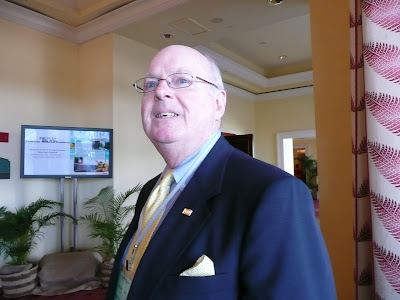Montego Bay, JAMAICA, February 2010.- Approximately fifteen minutes of driving through lush jungle on a winding road outside of Montego Bay, we reach our destination, a Rastafarian Village, tucked away from society on beautiful petit rolling hills, dotted with vibrant colors, tropical birds and thick towering bamboo. This is one of sixteen Rastafarian groups found in Jamaica.


On a warm sunny Jamaican morning we had the opportunity of visiting this Rastafarian village, along with a group of uniformed High school students. We were inititally met by the owners of the estate, the Nelson's and their daughter Andrea, who have donated a portion of their land to promote the Rastafarian lifestyle.

First Man introducing high school students to the Village
Welcoming all and preparing for symbolic cleansing with crossing of stream
After our meeting with the Nelson's, we were introduced to "First Man," a tall and imposing figure,who gave us a general description of the compound and respectful rules to follow. As we descended a gently sloping hill we came upon a beautiful, clear stream, separating the compound from the estate.


Official Welcoming by "First Man"

Crossing this stream was like a symbolic cleansing, before entering on sacred land. Not so far off in the distance, we heard the sound of gentle drumming, bathing our ears with a soothing rhythm, interrupted with brief staccato attacks, preparing our auditory senses for an interesting day. With the drumming in the background, "First Man's" baritone voice quietly continued his explanation of the many medically important indigenous plants, fruits and vegetables used by the Rastas on a daily basis. The smell of wood burning and the pungent scent of cannabis lingering in the background combined with the drumming, had a very calming effect on our sense of reality. With two of our sensory systems, (olfactory & auditory) becoming acclimated to our new envirnoment and our inhibitions lessening, we were now well on the road to opening to the Rasta experience.




Initial greeting and drinking of coconut water

As we ascended the gentle hill, the drumming and scents were accentuated on entering the Village. We were met by other Rastas, who offered us coconut water out of halved gourds, while we sat and “took in” the warm, relaxed and friendly ambience of our new surroundings.

 Extolling the virtues of organic growing and eating...
Extolling the virtues of organic growing and eating...

As we sat drinking coconut water, about twenty feet away the drummers were playing under an open aired Palapa, used for ceremonies, music and educational presentations.
To our right was the Rasta colored “Tea Hut”, where food and drink were prepared and dispensed by the women of the community. After our coco water we were taken on a tour of the compound, showing us the herbal gardens and organic farming area. A variety of huts were utilized for different purposes; Spa hut for massages and herbal baths, craft hut for selling locally made products and the Reason hut, for exhibits and educational functions.

Sitting on top of an open wood burning stove, a large pot filled with shredded coconut boiled, ultimately ending up as coconut oil, used in many of their food preparations.


An educational exhibit was given under the main hut by one of the members, extolling the benefits of natural eating and shunning its opposite brethren. This was a well done and very specific talk on processed foods, their determental affects and how to read and understand labeling on bottles, cans, etc. This lecture would do well in every school room in the U.S., beginning in elementary schools.



 Taking a coconut milk break from drumming
Taking a coconut milk break from drumming
As we sat under the warm Jamaican sun with a potpouri of scents in the background, listening to the drummers and enjoying our Rasta hosts, we gave thanks for the opportunity of experiencing this rich and varied culture. The Rastafarians have given Jamaica a special place in historyand have shared this with the world via its music and culture. With Rastafarian lifestyles found on every continent, there is only one place where you experience the real thing, and that's Jamaica. The world has Jamaica to thank for permitting this beautiful culture to survive and thrive.
This life style proposes healthy organic eating, self sufficiency, peacefullness, conservation, education and avoidance of alcohol. While not the lifestyle for all, there are many positive attributes to be gained from observing the Rastafarian culture. We thoroughly enjoyed our temporary stay, and plan to return on our next trip to Jamaica.
For reservations please contact: andrea_purkiss@yahoo.com
First Man's email adress: blessings@rastavillage.com























